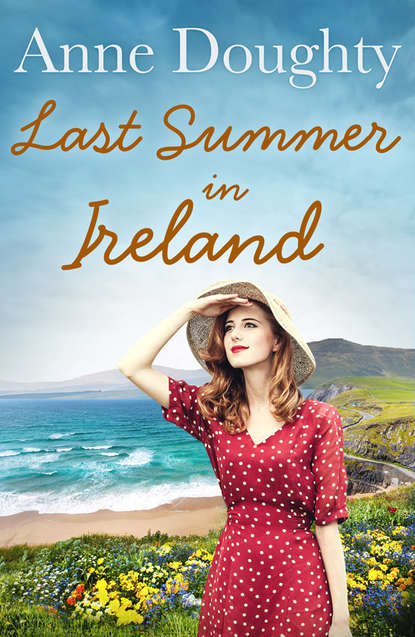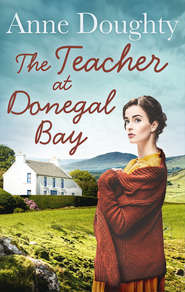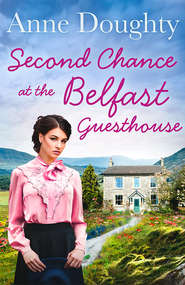По всем вопросам обращайтесь на: info@litportal.ru
(©) 2003-2024.
✖
Last Summer in Ireland
Автор
Год написания книги
2019
Настройки чтения
Размер шрифта
Высота строк
Поля
‘If I say yes, when will you go?’
‘Tomorrow, Sir, as soon after the noon hour as I can finish my tasks.’
‘Very well, then. Come to me at this hour and we shall see if your pitcher brings back my appetite. Go now and eat. May your food bring you strength.’
‘Thank you, Sir. May your sleep bring you peace.’
Deara smiled at the brehon and bowed her head as she returned the evening greeting. Then she walked from the Hall of Council into the swirling woodsmoke of the cooking fires and the red flame of the sunset, carrying in her left hand the Royal brooch of Emain.
7 (#ulink_25b50276-abb9-5465-a6aa-aafe2c5c948c)
When I saw Deara walk from the Hall of Council, a free woman under the protection of the King himself, after all the anxiety she had suffered throughout that long day, I was so relieved and so excited I wanted to stand up and cheer. I wanted to run after her and throw my arms round her and challenge anyone who might have slighted her, and tell them to their face, ‘There, I told you so’.
What actually happened was very different. I opened my eyes only to find myself under the hawthorns, exactly where I’d sat myself down when the awful agitation came upon me and I’d started making a mess of everything I tried to do.
Plainly, I couldn’t chase after Deara, so I made no move at all, just went on sitting in the dappled shade, looking out over the lawn and enjoying the splashes and patches of colour in the flourishing borders. But I was so grateful something had come to help Deara in her need. At the same time, I couldn’t help being totally absorbed and enthralled by the remote world in which she lived. I found I was running through the whole of her time in the Hall of Council once again, minute by minute, detail by detail.
I was intrigued by the unwritten law Morrough administered in such an extraordinary fashion and the customs and practices of the people over whom he ruled. I was appalled by Conor the Druid, curious about this person, Alcelcius, whose home was soon to be Deara’s, and absolutely intrigued by Sennach the brehon with his tally system for reckoning wealth and his new language he had taught himself over the last three winters.
There was so much more I wanted to know, so many questions I was dying to ask. How I wished I’d been able to see those documents on his table, particularly the one in Merdaine’s hand. I love old documents of any kind. Regardless of their content, I feel they bring you so close to the person who wrote them. I’ve often imagined how exciting it would be to touch something really old and precious, the kind of thing now kept behind security glass with alarm systems like the Lindisfarne Gospels, or the Book of Kells, or the one I should like to handle most of all, the Book of Armagh itself.
Sennach was such a precise character, meticulous and methodical. His long, pale face reminded me of a man who used to work with Daddy in the shop. Poor man, he never looked well, but he was still alive, able to dig his garden despite his eight decades while Daddy was long gone.
I sat on and on, with so much going through my head I couldn’t begin to sort it all out. Suddenly, everything cleared and words took shape just as if someone had spoken them out loud. It was the advice Merdaine had given to Deara just before she died. ‘If you do as your heart speaks, then in your sorest need, help will come. But you must trust that it will come.’
I repeated the words aloud to myself. They made perfect sense, however many centuries might have passed since Merdaine herself had spoken them. Help would come for Deara, but only if she believed that it would. And if it would come for Deara, then it would come for me were I to believe that it would. The more I thought about it, the more it seemed to me Merdaine’s advice applied as much to me as to Deara. I had to confess to myself that I’d lost my hopefulness over the years, my confidence that things really would or could come out right for me. Oh yes, I’d achieved many things. I was successful after the fashion of my own world. I had a decent job and earned a reasonable income. But so much potential happiness was marred by my doubts and anxiety.
Suddenly and very sharply, I saw that Merdaine’s words were telling me it would be better for me to cherish hope, to develop new confidence and take a chance on failure, than to go on in my normal, cautious and considered way.
As the shadows lengthened across the lawn, reluctantly I went back into the house. As I came through the kitchen into the hall I stopped in my tracks and stared at a striking, arched arrangement of pear blossom and dark petalled tulips, set against the well-polished mirror above the hall table, as if I’d never laid eyes on it before. I laughed at myself.
For days now, all I could think of was getting through the cleaning jobs in the house so I’d be free to go out into the garden. And without being quite aware of what I was up to, I’d brought the garden back in with me. All the rooms were fresh and full of light. With the windows open, the smell of blossom and flowers outdoors mingled with the perfume from the branches and posies I’d arranged and placed in every possible corner.
‘No wonder the estate agent was so complimentary,’ I said aloud, as I passed down the hall. I pushed wide the sitting room door. Gone was the electric fire Mother had parked in the hearth, the clutter of small tables that fell over at the slightest provocation, the assorted ashtrays and piles of product catalogues that were her constant companions. Out in the garage I’d found the wrought iron companion set from the hearth and the old willow basket that once served the open fire. Filled with turf and logs from a dusty corner of the garden shed, it now stood ready for a wet afternoon or a chilly evening. To my amazement, I realised I was actually looking forward to sitting here, by a fire, in the lamplight.
Then I walked through the whole house and I wondered how I could ever have seen it as dark and dreary. I was amazed the effect a few well-placed objects retrieved from cupboards and drawers had had. I’d found them, stacked away like the fire irons and the log basket, things I’d once known and loved. Old-fashioned. Dustcatchers. Those were the words to describe any object that didn’t meet with Mother’s approval. Well, I’d certainly shifted plenty of dust, but as I stood looking over the banisters down into the heart of the house, it seemed to me that the light, warm summer breeze had swept something much more pervasive than dust out of Anacarrig, once and for all.
In the few dark hours of the short May night, Deara lay awake yet again. Despite the help the day had brought and the reassuring shape of Merdaine’s brooch in a pouch beneath her pillow, she felt uneasy. The hut seemed strange and empty, bereft of Merdaine’s spirit, untenanted, as if cold ash lay unswept in the hearth, food bowls stood unscoured and the strewn rushes browned with age as she had seen them often enough in homes abandoned after plague.
She looked up into the darkness. Through the smoke hole a single star shone in the deep midnight sky. Outside there were myriads of stars, so still and perfect the night, but from her bed she could see but one, solitary, in all that great gathering.
That was exactly how she felt. She was surrounded by people, she was close enough to touch them, speak to them, to share food with them, but all the time she remained separate. Isolated. She wondered if anyone in all Emain felt as she did, lying wide-eyed on her narrow wooden couch.
She turned onto her side, curling the woollen rug around her, seeking comfort more than warmth. She closed her eyes. Immediately she stood again in the Hall of Council. She heard Conor’s voice.
‘You lie. Your name is not Deara. It is Deirdre.’
She shivered, the memory as fearful as the moment itself had been. Yes, she was Deirdre. She bore a name given to no girl-child in all the tribes of the land. Deirdre. Deirdre of the Sorrows. Any child old enough to sit by a campfire could tell you the tale by heart. It was not the name itself but the manner of her name-giving that called up anxiety and despair within her, an aching pain, which Merdaine herself had not been able to heal, the hurt of memories which Conor would never allow to rest.
Her mind began to fill with images. Now they had begun she had no power to stop them. She felt her body stiffen, her fingernails bite the softness of her palms, her chest tighten as if to restrain her racing heart.
The horses’ hooves were drumming in her ears. Faster and faster they came, clods of earth thrown back as they galloped towards Emain and the safety of the stockades. But it was too far. With weapons flashing in the moonlight the warriors turned aside to the grove on the far hillside to make what defence they could against the assailants who had lain in wait for them almost at the entrance to their own encampment. They gathered close around a woman in their midst. Half-crazed by fear and noise the white mare crashed between the trees and stopped abruptly in the small clearing which surrounded the stone altar to the God. The woman, white as the mare she rode, half slid, half fell to the ground. She lay there writhing in pain as the warriors made what brief defence they could against the encircling host.
Tears streamed down Deara’s face, her body began to shake uncontrollably. Let it come, said Merdaine. To heal the pain you must let yourself feel it. You must accept it. Do not fight it, do not deny it. Deny it and you give it power. Accept it and it becomes part of you, subject to your own power.
She had not understood. Nor did she understand now. And now there was no Merdaine to comfort her, to wipe away her tears and assure her that one day the images would go, that remembrance would no longer be like a knife in her heart.
She could see the woman now. She lay exhausted against the God’s altar beyond the fallen lords of Emain. Across the valley horns rang out, the alarm was raised, but above the noise of warriors riding out in pursuit of the raiders came a far more menacing sound.
‘There she is, there is the evil of which I warned you. The one for whom our best warriors have given their lives so worthlessly, their honour ensnared by her evil spells. Kill her, my friends. Avenge your dead comrades.’
Conor, his staff raised in his hands, his eyes glittering, burst into the clearing, a group of young warriors at his elbow. Swords drawn, ready to do battle with the whole host of Tara, they faltered as they saw in the moonlight the dark, still shapes which lay before them and the deadly-white face of a woman in a blood-soaked gown. In that moment of stillness they heard, as Deara now did, the tiny mewing cry of a newborn child.
‘Why do you pause? Think you this is a woman? Nay, no woman this, but evil itself in woman’s garb. See she spawns evil as she has spawned death on this hillside. Come despatch her and her cub. Let us make them a sacrifice to Lug that he will give us vengeance for Tagganath and all our brave kin. What use this Nodons, this mealy-mouthed God who cures warts for hags and protects not our bravest and best? Away with them.’
The warriors surged forward. The woman raised her head. Her voice was but a whisper, but there was no fear in it. All there heard her speak.
‘Kill me if you will – gladly I go – but not this child. Here do I name her Deirdre. Sorrow is her birthright and sorrow she shall know, but the greatest sorrow of all comes to him that shall wish her harm.’
With enormous effort the woman gathered herself, so that she sat upright, her back against the stone altar in front of the well, the child cradled in her lap.
‘Send me a woman of your tribe.’
‘Woman? To be your slave? A slave’s slave?’
Conor roared in fury. He stepped from the darkness of the encircling trees into the moonlight, his dark shadow enlarged by the flicker of torches which had now been brought.
‘Stand aside, Conor.’
It was Merdaine who spoke. It was she who wrapped the child in her cloak and waved the warriors away.
‘This woman’s blood is spilt already. Go home and comfort your wives and mothers. There are dead enough to carry to the fires.’
Deara wept.
She wept for her mother who died in Merdaine’s arms. And she wept for Merdaine. She wept for the women who knelt by the bodies of husband, or son. She wept for the sorrow in the face of the brehon, the fear in the eyes of the King. She wept till her arms were damp with tears and the star had faded from the smoke hole. Then she fell asleep.
Long after dawn had broken she woke, her dream still alive in her memory. She had been walking in sunshine, across fields of kingcups. Green and gold. The colours beloved of the God. It was a sign. She knew now what she must do. Merdaine’s parting gift, the kingcups, refreshed now in the cool shadows of the hut, must be offered for Sennach, for the healing of his spirit. She must make haste with her morning duties.
The God’s well was not far from Emain. Beyond the outer rampart it lay just across the valley in a small hawthorn grove, the surviving trees of a wood which once covered the whole hillside.
At one time, individuals as well as those who served the God would visit the well. They would leave an offering, tie a scrap of fabric to the branches and ask for healing for the person from whose tunic the fragment had been cut. Merdaine could remember a time when the thorns had blossomed with tokens all the year round. Now, few people went there except herself.
Deara went often, either to fetch water for infusions, for the water from the God’s well was pure and clear and had never failed, or to pray for the sick. It was many years now since Merdaine had come with her. As soon as Deara was strong enough to bear the water pitcher by herself she had sent her alone, saying that she would worship in her own place. So Deara had come to know hours of quiet, the only times in the crowded life of the encampment when she was alone. Alone, and yet never troubled by the loneliness which was her companion in the midst of the crowded encampment. Her visits to the God’s well were always welcome. Today was no exception.
As she set off down the dusty path, Deara was aware of a sense of excitement. Some flicker of happiness had rekindled within her. Drawing warmth from the brilliant sunshine and power from the upturned faces of buttercups and daisies strewn amid the grass of the wayside, it grew stronger as she crossed the valley and made her way up the slope beyond.
It was five days since she had brought back the full pitcher to wash Merdaine’s body. Now the hawthorns carried the first touch of blossom. The familiar heavy scent drifted towards her on heat-shimmered air as she followed the thread of a path through the encircling trees. The place was deserted and full of deep stillness. Before her lay the stone altar on which she would offer Merdaine’s parting gift.







